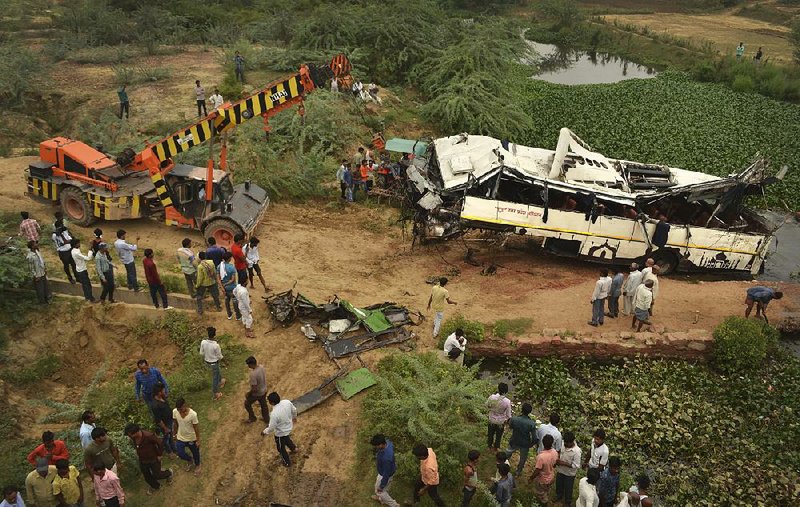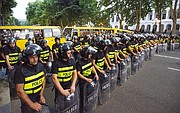India bus crash kills at least 29 people
LUCKNOW, India -- A speeding bus smashed through the boundary wall of an expressway bridge and plunged into a drain in northern India early Monday, killing at least 29 people on board, an official said.
Most passengers were sleeping when the accident occurred on Yamuna Expressway near Agra in Uttar Pradesh state, said government spokesman Awanish Awasthi. The bus was on its way to New Delhi from Lucknow, the state capital.
Awasthi said 18 injured passengers were hospitalized with six of them in serious condition.
The cause of the crash is being investigated, he said.
"The bus was speeding and the driver probably dozed off," District Magistrate N.G. Ravi Kumar told reporters. He didn't know whether the driver was among the dead.
India has the world's deadliest roads, with about 150,000 killed and 470,000 injured annually. Most crashes are blamed on reckless driving, poorly maintained roads and aging vehicles.
5.7 temblor jolts southwest Iran town
TEHRAN, Iran -- A magnitude-5.7 earthquake jolted a town in southwestern Iran on Monday, injuring more than 100 people and damaging buildings.
The semi-official Iranian Labor News Agency said seven out of the 112 people injured were hospitalized, and an older man died of a heart attack during the earthquake.
Rescue teams were still combing the mountainous area around the town of Masjid Soleiman in the Khuzestan province bordering Iraq. Some 6,000 people live in 15 villages near the epicenter.
State TV showed footage of damaged buildings and piles of rubble. Iman Nazarpour, a local resident, said the quake damaged buildings in the center of town. Rahim Zaheri, another resident, said some older buildings had collapsed while others showed cracks.
Iran is located on major seismic faults and experiences one earthquake per day on average. In 2003, a magnitude-6.6 earthquake flattened the historic city of Bam in southern Iran, killing 26,000 people.
The U.S. Geological Survey said Monday's quake was centered 17 miles southeast of Masjid Soleiman, and at a depth of 6 miles. At least five aftershocks were recorded, and tremors were felt as far away as Kuwait.
The town was the site of the first oil well in Iran and the Middle East.
Military council to dissolve in Sudan
KHARTOUM, Sudan -- Sudan's top general said the military council that assumed power after the overthrow of President Omar al-Bashir in April will be dissolved with the implementation of a power-sharing deal reached with protesters.
The military and a pro-democracy coalition agreed last week on a joint sovereign council that will rule for a little over three years while elections are organized. Both sides say a diplomatic push by the U.S. and its Arab allies was key to ending a weekslong standoff that raised fears of all-out civil war.
Gen. Abdel-Fattah Burhan, head of the military council, said in televised comments late Sunday that the army would return to its barracks after 21 months, when leadership of the council passes from a military representative to a civilian.
The council will include five civilians representing the protest movement and five military members. An 11th seat will go to a civilian chosen by both sides. The protesters will select a Cabinet of technocrats, and a legislative council is to be formed after three months.
Burhan said the sovereign council would have a veto on Cabinet appointees and the body's decisions. He said the transitional period would be dedicated to advancing peace efforts with rebel groups and overhauling the economy.
Burhan also insisted that the military council did not order the violent dispersal of the main protest camp last month, which killed scores of people and led to the collapse of talks.
"We trust that military council members had nothing to do with what happened in the sit-in dispersal," he said.
Hong Kong leader: Extradition bill 'dead'
HONG KONG -- Hong Kong leader Carrie Lam said today that a contentious bill to allow extraditions to China was "dead."
"Our work on the extradition bill amendment is a complete failure," Lam told reporters in Hong Kong.
It was unclear whether the bill was being formally withdrawn. Lam had announced June 15 that the bill had been indefinitely suspended.
Lam noted today that there were "lingering doubts about the government's sincerity, or worries whether the government will restart the process in the Legislative Council."
But, she added, "I reiterate here, there is no such plan. The bill is dead."
She also appeared to dismiss calls for her resignation, saying, "I still have the passion to govern Hong Kong."
Hundreds of thousands of people in the territory have protested against the bill. Protesters are demanding an independent investigation into a crackdown on June 12 demonstrations in which officers used tear gas and rubber bullets to disperse crowds.
Lam pledged that investigations would take place "in accordance with the evidence, the law and also the prosecution code."
A Section on 07/09/2019

